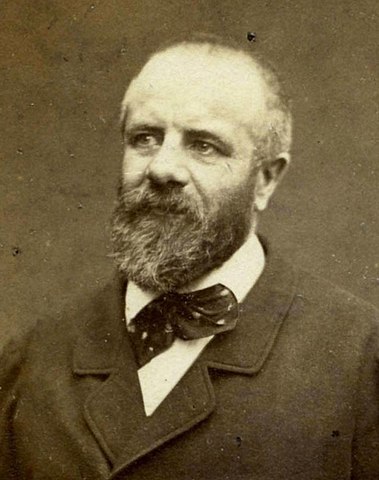2023-09-22
Eugene Pottier
BURIED ALIVE.
The heady odours o’er the lands
Make drunk young lovers as they wend ;
I saw a man with horny hands
Into a tenebrous hole descend.
The heavens dazzle ; luscious June
Her sap of gladness doth distil ;
Bees honey make and hum in tune—
The man is in his black hole still !
How good a thing is idleness !
The lizards whisper, “ Let us sleep ! ״
The mellow airs, with a caress,
Over the languid senses creep.—
The man’s hand did a lantern shield—
Dormice and rabbits with a will
Make merry in the clover-field—
The man is in his black hole still!
Schoolboys should hie on such a day
To gambol ’neath the forest trees ;
The workshop windows all the way
Stand open to the summer breeze.
What does he, hidden from the light ?
Oh, in the sun, upon the hill,
The ant-heaps are a pleasant sight !—
The man is in his black hole still!
The cricket doth his rattle spring,
Night falls, and all is hushed in rest,
With head ensconced beneath her wing,
The sparrow sleeps in her warm nest.
But is not his long day’s work sped ?
The stars of eve come forth until
Heaven’s vault is all irradiated —
The man is in his black hole still!
He comes! On what funereal ground
Abideth this black man accurst ?
Denser than the shades night casts around
The solid darkness he has burst.
O miner! to a graveyard here
Thy hard lot binds thee, to thy ill ;
Coffined in life or on the bier,
The man is in his black hole still!
Eugene Pottier - communard, author of The Internationale.
(Translated by Lavra Lafargue).
Commonweal 5, no. 170 (13 April 1889): 115

V. I. Lenin
1913
EUGÈNE POTTIER
THE 25TH ANNIVERSARY OF HIS DEATH
In November of last year—1912—it was twenty-five years since the death of the French worker-poet, Eugène Pottier, author of the famous proletarian song, the Internationale (“Arise ye starvelings from your slumbers”, etc.).
This song has been translated into all European and other languages. In whatever country a class-conscious worker finds himself, wherever fate may cast him, however much he may feel himself a stranger, without language, without friends, far from his native country—he can find himself comrades and friends by the familiar refrain of the Internationale.
The workers of all countries have adopted the song of their foremost fighter, the proletarian poet, and have made it the world-wide song of the proletariat.
And so the workers of all countries now honour the memory of Eugène Pottier. His wife and daughter are still alive and living in poverty, as the author of the Internationale lived all his life. He was born in Paris on October 4, 1816. He was 14 when he composed his first song, and it was called: Long Live Liberty! In 1848 he was a fighter on the barricades in the workers’ great battle against the bourgeoisie.
Pottier was born into a poor family, and all his life remained a poor man, a proletarian, earning his bread as a packer and later by tracing patterns on fabrics.
From 1840 onwards, he responded to all great events in the life of France with militant songs, awakening the consciousness of the backward, calling on the workers to unite, castigating the bourgeoisie and the bourgeois governments of France.
In the days of the great Paris Commune (1871), Pottier was elected a member. Of the 3,600 votes cast, he received 3,352. He took part in all the activities of the Commune, that first proletarian government.
The fall of the Commune forced Pottier to flee to England, and then to America. His famous song, the Internationale, was written in June 1871—you might say, the day after the bloody defeat in May.
The Commune was crushed—but Pottier’s Internationale spread its ideas throughout the world, and it is now more alive than ever before.
In 1876, in exile, Pottier wrote a poem, The Workingmen of America to the Workingmen of France. In it he described the life of workers under the yoke of capitalism, their poverty, their back-breaking toil, their exploitation, and their firm confidence in the coming victory of their cause.
It was only nine years after the Commune that Pottier returned to France, where he at once joined the Workers’ Party. The first volume of his verse was published in 1884, the second volume, entitled Revolutionary Songs, came out in 1887.
A number of other songs by the worker-poet were published after his death.
On November 8, 1887, the workers of Paris carried the remains of Eugène Pottier to the Père Lachaise cemetery, where the executed Communards are buried. The police savagely attacked the crowd in an effort to snatch the red banner. A vast crowd took part in the civic funeral. On all sides there were shouts of “Long live Pottier!”
Pottier died in poverty. But he left a memorial which is truly more enduring than the handiwork of man. He was one of the greatest propagandists by song. When he was composing his first song, the number of worker socialists ran to tens, at most. Eugène Pottier’s historic song is now known to tens of millions of proletarians.
Other translations in Commonweal:
Pottier, “Plenty,” Commonweal 5, no. 185 (27 July 1889): 237;
Pottier, “Blanqui,” Commonweal 5, no. 193 (21 September 1889): 301;
Pottier, “Marguerite: To My Daughter, M.P.,” Commonweal 5, no. 196 (12 October 1889): 325;
Pottier, “The Anthropophagite,” Commonweal 5, no. 207 (28 December 1889): 411;
Pottier, “Don Quixote,” Commonweal 6, no. 222 (12 April 1890): 115.
Commonweal - https://catalog.hathitrust.org/Record/000544678
Russian translations - Эжен Потье